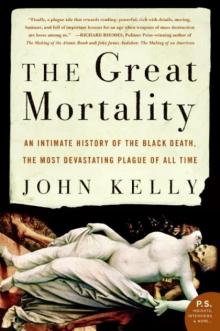The Great Mortality: An Intimate History of the Black Death, the Most Devastating Plague of All Time 

by John Kelly
Genre: Other9
Published: 2005
View: 5901
Read OnlineRead The Great Mortality: An Intimate History of the Black Death, the Most Devastating Plague of All Time Storyline:
La moria grandissima began its terrible journey across the European and Asian continents in 1347, leaving unimaginable devastation in its wake. Five years later, twenty-five million people were dead, felled by the scourge that would come to be called the Black Death. The Great Mortality is the extraordinary epic account of the worst natural disaster in European history -- a drama of courage, cowardice, misery, madness, and sacrifice that brilliantly illuminates humankind's darkest days when an old world ended and a new world was born. Amazon.com ReviewA book chronicling one of the worst human disasters in recorded history really has no business being entertaining. But John Kelly's The Great Mortality is a page-turner despite its grim subject matter and graphic detail. Credit Kelly's animated prose and uncanny ability to drop his reader smack in the middle of the 14th century, as a heretofore unknown menace stalks Eurasia from "from the China Sea to the sleepy fishing villages of coastal Portugal [producing] suffering and death on a scale that, even after two world wars and twenty-seven million AIDS deaths worldwide, remains astonishing." Take Kelly's vivid description of London in the fall of 1348: "A nighttime walk across Medieval London would probably take only twenty minutes or so, but traversing the daytime city was a different matter.... Imagine a shopping mall where everyone shouts, no one washes, front teeth are uncommon and the shopping music is provided by the slaughterhouse up the road." Yikes, and that's before just about everything with a pulse starts dying and piling up in the streets, reducing the population of Europe by anywhere from a third to 60 percent in a few short years. In addition to taking readers on a walking tour through plague-ravaged Europe, Kelly heaps on the ancillary information and every last bit of it is captivating. We get a thorough breakdown of the three types of plagues that prey on humans; a detailed account of how the plague traveled from nation to nation (initially by boat via flea-infested rats); how floods (and the appalling hygiene of medieval people) made Europe so susceptible to the disease; how the plague triggered a new social hierarchy favoring women and the proletariat but also sparked vicious anti-Semitism; and especially, how the plague forever changed the way people viewed the church. Engrossing, accessible, and brimming with first-hand accounts drawn from the Middle Ages, The Great Mortality illuminates and inspires. History just doesn't get better than that. --Kim HughesFrom Publishers WeeklyThe Black Death raced across Europe from the 1340s to the early 1350s, killing a third of the population. Drawing on recent research as well as firsthand accounts, veteran author Kelly (Three on the Edge, etc.) describes how infected rats, brought by Genoese trading ships returning from the East and docked in Sicily, carried fleas that spread the disease when they bit humans. Two types of plague seem to have predominated: bubonic plague, characterized by swollen lymph nodes and the bubo, a type of boil; and pneumonic plague, characterized by lung infection and spitting blood. Those stricken with plague died quickly. Survivors often attempted to flee, but the plague was so widespread that there was virtually no escape from infection. Kelly recounts the varied reactions to the plague. The citizens of Venice, for example, forged a civic response to the crisis, while Avignon fell apart. The author details the emergence of Flagellants, unruly gangs who believed the plague was a punishment from God and roamed the countryside flogging themselves as a penance. Rounding up and burning Jews, whom they blamed for the plague, the Flagellants also sparked widespread anti-Semitism. This is an excellent overview, accessible and engrossing. Copyright © Reed Business Information, a division of Reed Elsevier Inc. All rights reserved.Pages of The Great Mortality: An Intimate History of the Black Death, the Most Devastating Plague of All Time :